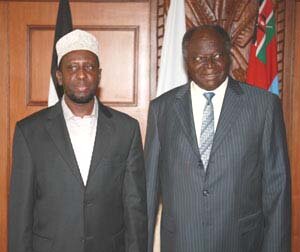
Bartamaha (Nairobi):- Somalia’s president wants thousands of troops trained in Kenya to be deployed to Mogadishu for an upcoming offensive against Islamist militants, but Kenya has denied the request – yet another complication for a military campaign that has already been delayed several times, officials said Tuesday.
The fact that Kenya could veto Somali wishes for the deployment of its own troops underscores that the Kenyan government wields power in the neighboring country, which has a weak, U.N.-backed government.
In a March 21 letter that The Associated Press obtained a copy of, Somali President Sharif Sheik Ahmed asked Kenyan President Mwai Kibaki for Kenya’s support for a plan to transfer control of 2,500 Somali troops trained in Kenya over the last several months to the current defense minister.
That would mean the troops would be moved from the Somali-Kenya border to the Somali capital, Mogadishu, large parts of which are controlled by al-Shabab, a militant group linked to al-Qaida.
Kenya’s president rejected the plan based on fears that if the troops are sent to Mogadishu, Kenya’s porous frontier with Somalia would be vulnerable to cross-border incursions, said a Somali government official who spoke on condition he not be identified because of the sensitivity of the matter.
Kenyan government spokesman Alfred Mutua declined to comment.
“Kibaki respects Somalia’s president and his government, but when it comes to national security, Kenya’s interest comes first,” said Abdullahi Hassan, a political analyst and lecturer at Nairobi’s Kenyatta University.
It was not known if the issue would cause further delays to an offensive aimed at restoring Somali government control to large parts of Somalia and hitting a radical movement that has imposed harsh justice, including stonings and amputations, and stoked terrorism fears in the Horn of Africa and beyond. The offensive has been pushed back repeatedly, in part because of a lack of military resources.
Kenya mediated a two-year peace process that led to the formation of Somalia’s fragile government and hosts hundreds of thousands of Somali refugees. Leaders of Somalia’s government have regularly consulted with their Kenyan counterparts. Some of the troops trained in Kenya were rumored to be Kenyan nationals of Somali origin.
“The whole training exercise was a Kenyan-led initiative that involved elements within the Somali government. It was part of Kenya’s overall military containment strategy against al-Shabab and it does not want to lose control of that process despite its support for the Somali government,” said Rashid Abdi of the International Crisis Group.
For more than five months, Kenya has been training more than 2,500 Somali troops on its soil. The initial plan was for them to be deployed to the border to eliminate threats posed by al-Shabab, said clan elder Sheik Ali Gure, who helped recruit the troops from three Somali regions near Kenya. Al-Shabab controls large swaths of southern and central Somalia.
A U.N. Monitoring Group report this month found that the Somali military is dominated by a command structure based on clan loyalties. The dustup between Kenya and Somalia over troop deployment underscores those clan arrangements.
Gure warned that if the Kenyan-trained troops were transferred to Mogadishu, Somali clans along the border could withdraw their support for the Somali government. The clans want the troops to stay in their regions to take on al-Shabab there.
Kenya has a large Somali population that inhabits the northeastern part of the country, and has over the years used local clans who straddle territories between the two countries to intervene when rebels groups try to cross the border.
————–
Source:- Washington Post
By MALKHADIR M. MUHUMED
The Associated Press



